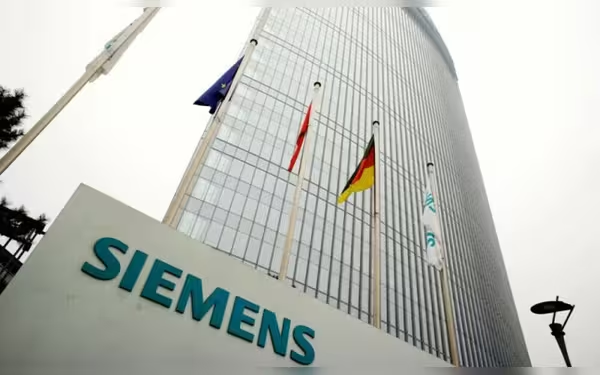Saturday, November 16, 2024 07:44 PM
Siemens Acquires Altair Engineering for $10.6 Billion
- Siemens strengthens software portfolio with Altair acquisition.
- Acquisition boosts Siemens' market share in PLM sector.
- Strategic move enhances Siemens' AI and simulation capabilities.
 Image Credits: brecorder
Image Credits: brecorderSiemens acquires Altair Engineering for $10.6 billion, enhancing its industrial software and AI capabilities.
In a significant move to bolster its industrial software capabilities, Siemens has announced its acquisition of Altair Engineering, a U.S.-based engineering software firm, for a staggering $10.6 billion. This acquisition marks Siemens' second-largest purchase to date and underscores the company's commitment to expanding its footprint in the rapidly evolving industrial software market, which is increasingly influenced by advancements in data analysis and artificial intelligence.
Altair Engineering, headquartered in Michigan, specializes in product lifecycle management (PLM) systems. These systems are essential for managing the entire lifecycle of a product, from its initial conception and development to manufacturing, servicing, and eventual disposal. The PLM simulation software market is currently valued at approximately $10 billion annually and is projected to grow by 10% over the next five years, according to Siemens.
With this acquisition, Siemens is set to enhance its market share in the PLM sector, increasing it from 9% to 15%. This leap will elevate Siemens from the fourth position to the second position in the market, trailing only behind Ansys, which holds a 23% share. Other competitors in this space include MathWorks, with 14%, and Dassault Systemes, which commands 10% of the market.
Siemens CEO Roland Busch expressed optimism about the merger, stating that the integration of Siemens’ online digital platform, Xcelerator, with Altair’s offerings “will create the world’s most complete AI-powered design and simulation portfolio.” This strategic alignment is expected to enhance Siemens’ earnings per share within two years following the deal's closure, which is anticipated in the latter half of 2025. Furthermore, Siemens expects to see an additional $500 million in annual revenue in the mid-term, with projections exceeding $1 billion annually in the long term.
While analysts have largely welcomed the acquisition, some concerns have been raised regarding the price tag, which reflects an 18.7% premium over Altair’s closing stock price on October 21, just before news of the potential sale broke. Analysts from Alpha Wertpapierhandel acknowledged that although the deal is not inexpensive, it is likely to strengthen Siemens’ digital industries division, which has faced challenges in recent times. Jefferies analyst Simon Toennessen noted that this acquisition would enhance Siemens' expertise in artificial intelligence and high-performance computing, positioning the company as a more formidable competitor against chip-design firms like Synopsys, which recently acquired Ansys, and Cadence Design Systems.
In addition to the Altair acquisition, Siemens has also announced the sale of its airport baggage and cargo handling business to Vanderlande, a subsidiary of Toyota Industries Corporation, for 300 million euros. This divestiture marks the final step in Siemens' strategy to streamline its portfolio, focusing on core areas such as transport, factory automation, and smart buildings.
Siemens' acquisition of Altair Engineering not only signifies a bold step towards enhancing its industrial software offerings but also reflects the broader trend of companies leveraging artificial intelligence and data analytics to drive innovation. As the industrial landscape continues to evolve, this strategic move positions Siemens to remain competitive and relevant in a market that is increasingly defined by technological advancements. For stakeholders and industry observers, this acquisition is a clear indication that the future of industrial software will be heavily influenced by the integration of AI and advanced simulation capabilities.













